Microsoft Azure Data Engineering Training Cou ...
- 16k Enrolled Learners
- Weekend
- Live Class
The Great White is considered to be the King of the Ocean. This is because the great White is on top of its game. Imagine if you could be on top of the game in the ocean of Big Data analytics!
Big Data is everywhere and there is almost an urgent need to collect and preserve whatever data is being generated, for the fear of missing out on something important. There is a huge amount of data floating around. What we do with it is all that matters right now. This is why Big Data Analytics is in the frontiers of IT. This has become crucial as it aids in improving business, decision makings and providing the biggest edge over the competitors. This applies for organizations as well as professionals in the Analytics domain. For professionals, who are skilled in Big Data Hadoop Course, there is an ocean of opportunities out there. For instance, with skills in Big Data and Hadoop, professionals can unlock a world of opportunities, like optimizing processes in the booming online loan industry. By analyzing vast datasets, lenders can make faster and more informed decisions, ultimately improving the loan application experience for customers.
If you are still not convinced by the fact that Big Data Analytics is one of the hottest skills, here are 10 more reasons for you to see the big picture.
Jeanne Harris, senior executive at Accenture Institute for High Performance, has stressed the significance of analytics professionals by saying, “…data is useless without the skill to analyze it.” rusbank.net. There are more job opportunities in Big Data management and Analytics than there were last year and many IT professionals are prepared to invest time and money for the training.
The job trend graph for Big Data Analytics, from Indeed.com, proves that there is a growing trend for it and as a result there is a steady increase in the number of job opportunities.
Source: Indeed.com
The current demand for qualified data professionals is just the beginning. Srikanth Velamakanni, the Bangalore-based cofounder and CEO of CA headquartered Fractal Analytics states: “In the next few years, the size of the analytics market will evolve to at least one-thirds of the global IT market from the current one-tenths”.
Technology professionals who are experienced in Analytics are in high demand as organizations are looking for ways to exploit the power of Big Data. The number of job postings related to Analytics in Indeed and Dice has increased substantially over the last 12 months. Other job sites are showing similar patterns as well. This apparent surge is due to the increased number of organizations implementing Analytics and thereby looking for Analytics professionals.
In a study by QuinStreet Inc., it was found that the trend of implementing Big Data Analytics is zooming and is considered to be a high priority among U.S. businesses. A majority of the organizations are in the process of implementing it or actively planning to add this feature within the next two years. Learn more about Big Data and its applications from the Data Engineering Courses online.
You can watch the sample class recording of Edureka’s Big Data and Hadoop course here:
The demand for Analytics skill is going up steadily but there is a huge deficit on the supply side. This is happening globally and is not restricted to any part of geography. In spite of Big Data Analytics being a ‘Hot’ job, there is still a large number of unfilled jobs across the globe due to shortage of required skill. A McKinsey Global Institute study states that the US will face a shortage of about 190,000 data scientists and 1.5 million managers and analysts who can understand and make decisions using Big Data by 2018.
To get in-depth knowledge on Data Science, you can enroll for live Data Science Certification Training by Edureka with 24/7 support and lifetime access.
India, currently has the highest concentration of analytics globally. In spite of this, the scarcity of data analytics talent is particularly acute and demand for talent is expected to be on the higher side as more global organizations are outsourcing their work.
According to Srikanth Velamakanni, co-founder and CEO of Fractal Analytics, there are two types of talent deficits: Data Scientists, who can perform analytics and Analytics Consultant, who can understand and use data. The talent supply for these job title, especially Data Scientists is extremely scarce and the demand is huge.
Strong demand for Data Analytics skills is boosting the wages for qualified professionals and making Big Data pay big bucks for the right skill. This phenomenon is being seen globally where countries like Australia and the U.K are witnessing this ‘Moolah Marathon’.
According to the 2015 Skills and Salary Survey Report published by the Institute of Analytics Professionals of Australia (IAPA), the annual median salary for data analysts is $130,000, up four per cent from last year. Continuing the trend set in 2013 and 2014, the median respondent earns 184% of the Australian full-time median salary. The rising demand for analytics professionals is also reflected in IAPA’s membership, which has grown to more than 5000 members in Australia since its formation in 2006.
Randstad states that the annual pay hikes for Analytics professionals in India is on an average 50% more than other IT professionals. According to The Indian Analytics Industry Salary Trend Report by Great Lakes Institute of Management, the average salaries for analytics professionals in India was up by 21% in 2015 as compared to 2014. The report also states that 14% of all analytics professionals get a salary of more than Rs. 15 lakh per annum.
A look at the salary trend for Big Data Analytics in the UK also indicates a positive and exponential growth. A quick search on Itjobswatch.co.uk shows a median salary of £62,500 in early 2016 for Big Data Analytics jobs, as compared to £55,000 in the same period in 2015. Also, a year-on-year median salary change of +13.63% is observed.
The table below looks at the statistics for Big Data Analytics skills in IT jobs advertised across the UK. Included is a guide to the salaries offered in IT jobs that have cited Big Data Analytics over the 3 months to 23 June 2016 with a comparison to the same period over the previous 2 years.
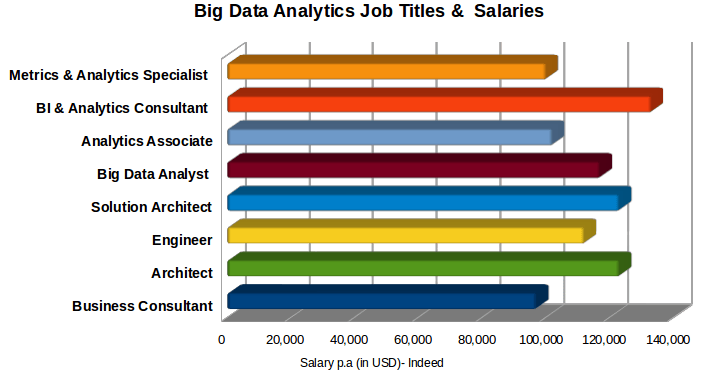
According to the ‘Peer Research – Big Data Analytics’ survey, it was concluded that it is one of the top priorities of the organizations participating in the survey as they believe that it improves the performances of their organizations.
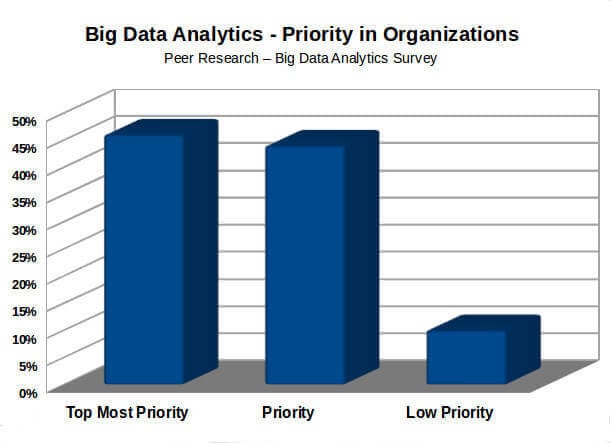
Based on the responses, it was found that approximately 45% of the surveyed believe that Big Data analytics will enable much more precise business insights, 38% are looking to use Analytics to recognize sales and market opportunities. More than 60% of the respondents are depending on Big Data Analytics to boost the organization’s social media marketing abilities. The QuinStreet research based on their survey also back the fact that Analytics is the need of the hour, where 77% of the respondents consider Big Data Analytics a top priority.
A survey by Deloitte, Technology in the Mid-Market; Perspectives and Priorities, reports that executives clearly see the value of analytics. Based on the survey, 65.2% of respondents are using some form of analytics that is helping their business needs. The image below clearly depicts their attitude and belief towards Big Data Analytics. Learn more about Big Data and its applications from the Azure Data Engineering Course in India.
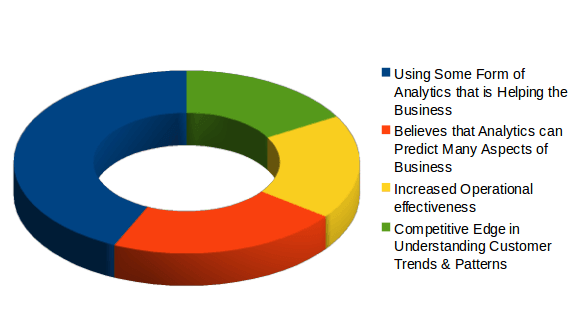
New technologies are now making it easier to perform increasingly sophisticated data analytics on a very large and diverse datasets. This is evident as the report from The Data Warehousing Institute (TDWI) shows. According to this report, more than a third of the respondents are currently using some form of advanced analytics on Big Data, for Business Intelligence, Predictive Analytics and Data Mining tasks.
With Big Data Analytics providing an edge over the competition, the rate of implementation of the necessary Analytics tools has increased exponentially. In fact, most of the respondents of the ‘Peer Research – Big Data Analytics’ survey reported that they already have a strategy setup for dealing with this tool. And those who are yet to come up with a strategy are also in the process of planning for it.
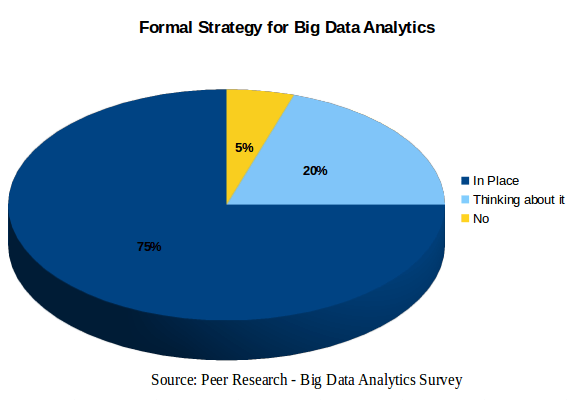 When it comes to this tools, the adoption of Apache Hadoop framework continues to be the popular choice. There are various commercial and open-source frameworks to choose from and organizations are making the appropriate choice based on their requirement. Over half of the respondents have already deployed or are currently implementing a Hadoop distribution. Out of them, a quarter of the respondents have deployed open-source framework, which is twice the number of organizations that have deployed a commercial distribution of the Hadoop framework.
When it comes to this tools, the adoption of Apache Hadoop framework continues to be the popular choice. There are various commercial and open-source frameworks to choose from and organizations are making the appropriate choice based on their requirement. Over half of the respondents have already deployed or are currently implementing a Hadoop distribution. Out of them, a quarter of the respondents have deployed open-source framework, which is twice the number of organizations that have deployed a commercial distribution of the Hadoop framework.
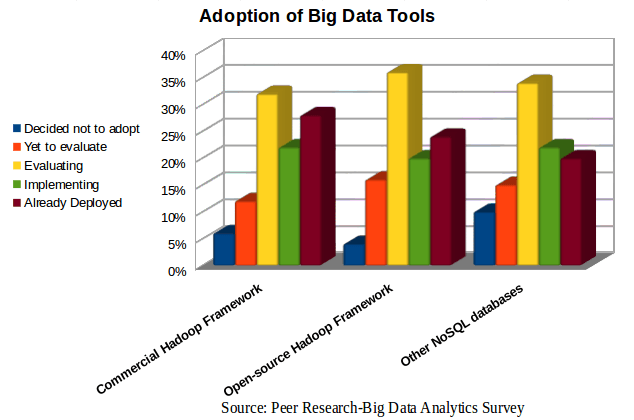
Analytics is a key competitive resource for many companies. There is no doubt about that. According to the ‘Analytics Advantage’ survey overseen by Tom Davenport, ninety six percent of respondents feel that analytics will become more important to their organizations in the next three years. This is because there is a huge amount of data that is not being used and at this point, only rudimentary analytics is being done. About forty nine percent of the respondents strongly believe that analytics is a key factor in better decision-making capabilities. Another sixteen percent like it for its superior key strategic initiatives.
Even though there is a fight for the title of ‘Greatest Benefit of Big Data Analytics’, one thing is undeniable and stands out the most: Analytics play an important role in driving business strategy and making effective business decisions.
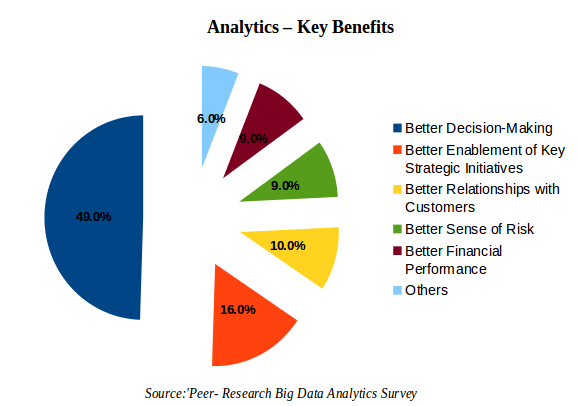
Seventy Four percent of the respondents of the survey report have agreed that it is adding value to their organization and allows vital information for making timely and effective business decisions of great importance. This is a clear indicator than Big Data Analytics is here to stay and a career in it is the wisest decision one can make.
The ‘Peer Research – Big Data Analytics’ survey clearly reports that there is a huge growth when it comes to unstructured and semistructured data analytics. Eighty four percent of the respondents have mentioned that the organization they work for are currently processing and analyzing unstructured data sources, including weblogs, social media, e-mail, photos, and video. The remaining respondents have indicated that steps are being taken to implement them in the next 12 to 18 months.
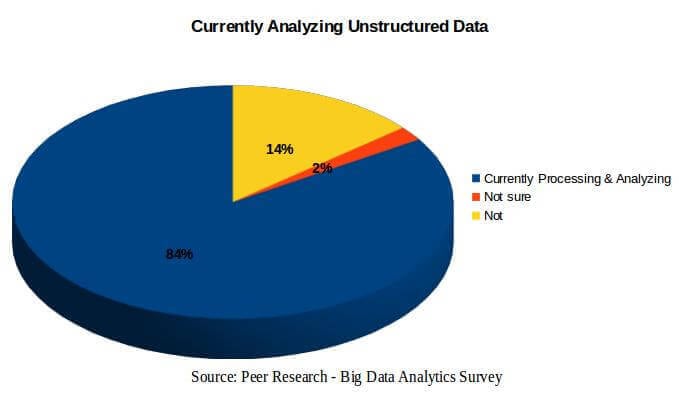
It is a given that there is a huge demand for Big Data Analytics owing to its awesome features. The tremendous growth is also due to the varied domain across which Analytics is being utilized. The image below depicts the job opportunities across various domains.
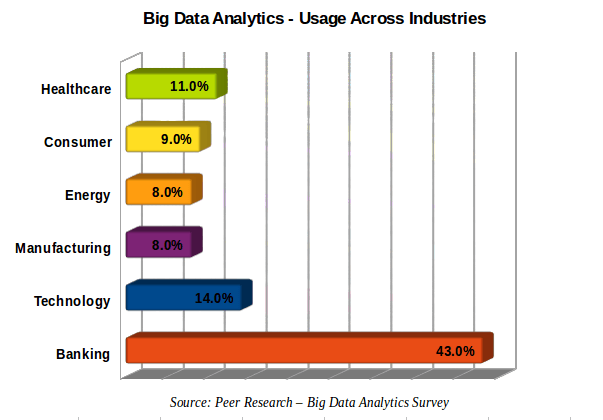
If you also want to learn Big data and make your career in it then I would suggest you must take up the following Big Data Architect Certification.
Big Data Analytics has topped a survey carried out by Nimbus Ninety, as the most disruptive technologies that will have the biggest influence in three years’ time. Added to this, there are more market forecasts that support this:
The Big Data Analytics Global Market for Apps and Analytics Technology will grow by 28.2% CAGR, for Cloud Technology will grow by 16.1% CAGR, for Computing Technology will grow by 7.1% CAGR, for NoSQL Technology will grow by 18.9% CAGR over the entire 2015-2020 period.
From a career point of view, there are so many option available, in terms of domain as well as nature of job. Since Analytics is utilized in varied fields, there are numerous job titles for one to choose from.
Big Data Analytics career is deep and one can choose from the 3 types of data analytics depending on the Big Data environment.
A huge array of organizations like Ayata, IBM, Alteryx, Teradata, TIBCO, Microsoft, Platfora, ITrend, Karmasphere, Oracle, Opera, Datameer, Pentaho, Centrofuge, FICO, Domo, Quid, Saffron, Jaspersoft, GoodData, Bluefin Labs, Tracx, Panaroma Software, and countless more are utilizing Big Data Analytics for their business needs and a huge job opportunities are possible with them.
Analytics no matter how advanced they are, does not remove the need for human insights. On the contrary, there is a compelling need for skilled people with the ability to understand data, think from the business point of view and come up with insights. For this very reason technology professionals with Analytics skill are finding themselves in high demand as businesses look to harness the power of Big Data. The Edureka’s Data architect course helps learners become expert in HDFS, Yarn, MapReduce, Pig, Hive, HBase, Oozie, Flume and Sqoop using real-time use cases on Retail, Social Media, Aviation, Tourism, Finance domain.A professional with Analytical skills can master the ocean of Big Data with the Big Data Training in Chicago and become a vital asset to an organization, boosting the business and their career.
Edureka has a specially curated Data Analyst Course that will make you proficient in tools and systems used by Data Analytics Professionals. It includes in-depth training on Statistics, Data Analytics with R, SAS, and Tableau. The curriculum has been determined by extensive research on 5000+ job descriptions across the globe.
Got a question for us? Please mention them in the comments section and we will get back to you.
 Thank you for registering Join Edureka Meetup community for 100+ Free Webinars each month JOIN MEETUP GROUP
Thank you for registering Join Edureka Meetup community for 100+ Free Webinars each month JOIN MEETUP GROUPedureka.co
Hello,
I am working as a java developer with 2 years of experience .I would like to know how can i get into bigdata developer.
Hey Uday, thank you for writing to us. You can definitely pursue a career in Big Data. The only prerequisite required here is knowledge in Java. We do provide a self paced course in java, if you are interested in the training. You can check out complete details about the course over here: https://www.edureka.co/big-data-hadoop-training-certification.
Hello,
I’d like to try my luck in this Big Data Analytics business. I have worked the past 6 years as Unix System Admin, involved in server builds from the machine to OS, to app prep, to testing and capacity management. I also have some scripting skills (not as good as those programming skills of developers). Is there any place in big data for me?
Hello,
Currently I am working as a Software Tester(QA). I have 6 months of experience in this field. I am
very much interested to pursue my career in Big Data Analytics. I have basic knowledge of core java. Please suggest me to learn the related technologies to get into the Big data analytics. I will
really appreciate if you can provide some guidance.
Thank you!!
Hi All,
I am a mainframe developer and have basics knowledge of core java. So, I want to move toward BIG DATA. I have found that in BIG data lot of courses potion are there. Which 1 would be the correct for strat as i have 5 years of experience and expertise of equivalency we need in big data.please assists.
Hi ,
I am currently working as Tableau developer. I have data visualization background with javascript. I am trying to find out best career path for me in big data or business intelligence path. I have strong SQL back ground as well.
What courses should I do. I am torn between choosing traditional business intelligence or datascience or Big data.
Which should be the best career choice for me, I am still more interested in Visulization.
Thanks
Ashima
Hi Everyone,
I am a mainframe Developer and feels to change my skills as per update of Market. So, Cloud computing platform is being one of big market skills. which would be great to learn for Mainframe guys. Salesforce/AWS/Big Data. Please let me know which will not affect the transition as I have experience of 6 years approx and equally skills i need learn and command on it should be in quick progression.
Thanks,
Sumit
Hello Sumit, that is very wise of you to feel the need to update yourself. Working in tech, you must’ve understood how quickly a cetain technology becomes outdated and is replaced by something new and exciting. Big data is definitely one of those new talk of the town. Also there is a rampant need for professionals in this sector with some companies offering handsome compensations in return.
As a pre-requisite we ask people to be well versed with core java and SQL. There is nothing to fear if you haven’t worked with java or SQL before. Along with the big data course, you will also get a full-paced core java course complementary.
Kindly drop in your contact details so that one of our experts could get in touch with you and answer all your queries.
hello sir/mam,
I m fresher. can i start my carrer in tis field ie- Big data hadoop
i m really very confused after that can i get a job easily because i m eagerly interested for this field.
Hey Srishti, thanks for checking out our blog.
Big Data presents plenty of career opportunities and learning Hadoop does open the doors to those opportunities. Some work experience is generally preferred for Hadoop job roles but you can get a head-start by training for Hadoop and getting equipped with the right skills. You can check out more details of our Hadoop training here: https://www.edureka.co/big-data-hadoop-training-certification.
Hope this helps. Cheers!
Hello. I am currently working as a Comptroller for a small company where my primary duties are bookkeeping and financial reporting. I have bachelor’s degree in accounting and never learned Java or SQL. I have watched several microstrategy videos and felt that most of the people learning this have some kind of IT background. I do not know any of that. I work with access and excel but wondering if i try to learn this program, is that going to be my cup of tea ? Please let me know asap as I really want to learn it but afraid that it will be too much to learn at such a late stage in my life. Thank you.
Hey Parag, thanks for checking out our blog. The pre-requisites to learn MicroStrategy include basic Knowledge of SQL, General relational database (Oracle), Microsoft Windows GUI, Windows Command line and basics of Unix. Going by your background as a comptroller, we suggest that you first skill-up with either Tableau (https://www.edureka.co/tableau-certification-training) or Qlikview (https://www.edureka.co/qlikview-certification-training). There are no pre-requisites for take up these courses. Once you have mastered either of these skills, you can go on to up-skill with MicroStrategy. Hope this helps. Cheers!
Hello i m garima pursuing graduation in btech cs branch in 6 Sem, nd i want to make my career in database field as i know dbms so plz help me how i make my future in this plzz help me as idont have intrest in coding.
With regards garima
Hey Garima, thanks for checking out our blog. You could opt for a Data Warehousing career track. You can learn the tools and skills required for this in our Data Warehousing course. Link here: https://www.edureka.co/data-warehousing-and-bi. You can also check out a Hadoop Developer career track. Hadoop allows you to use tools like pig and hive which are similar to SQL. In fact, Hive is most widely used. You can get started on Hadoop with our Big Data Hadoop course. Check out the pre-requisites and course curriculum here: https://www.edureka.co/big-data-hadoop-training-certification. Hope this helps. Cheers!
Hii
I am pursuing BCA from IGNOU, and i am looking for a career in Analytics field.
What are the skills required to be one.
Plz Help
Thanks
Hey Mukund, thanks for checking out our blog. As such, there are no pre-requisites for learning Hadoop, but knowledge of Core Java and SQL will be beneficial. You can check out more details about our Hadoop course here: https://www.edureka.co/big-data-hadoop-training-certification. If you would like to pursue a career in Big Data analytics, then Data Analytics with R may be a good choice. The pre-requisites to learn Data Analytics with R include basic statistics knowledge. Do check out the course details and curriculum here: https://www.edureka.co/data-analytics-with-r-certification-training.
You could start by picking up the skills and experience needed for the career track you have in mind and then go on to getting trained in Hadoop/ R. Hope this helps. Cheers!